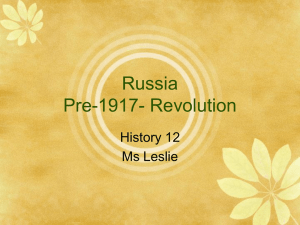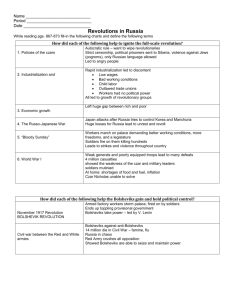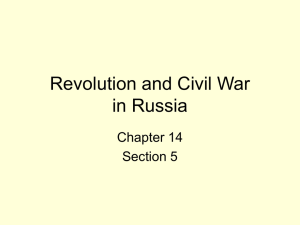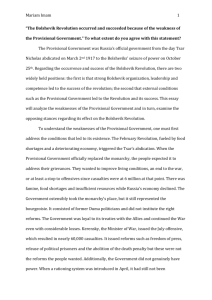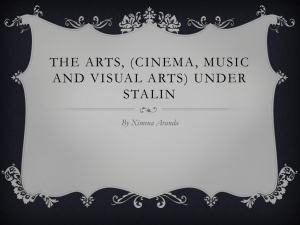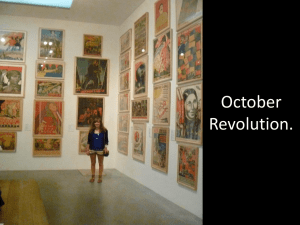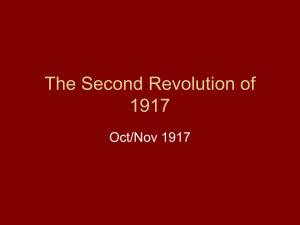Russian Revolution: Historians` Quotes - vcehistory
advertisement
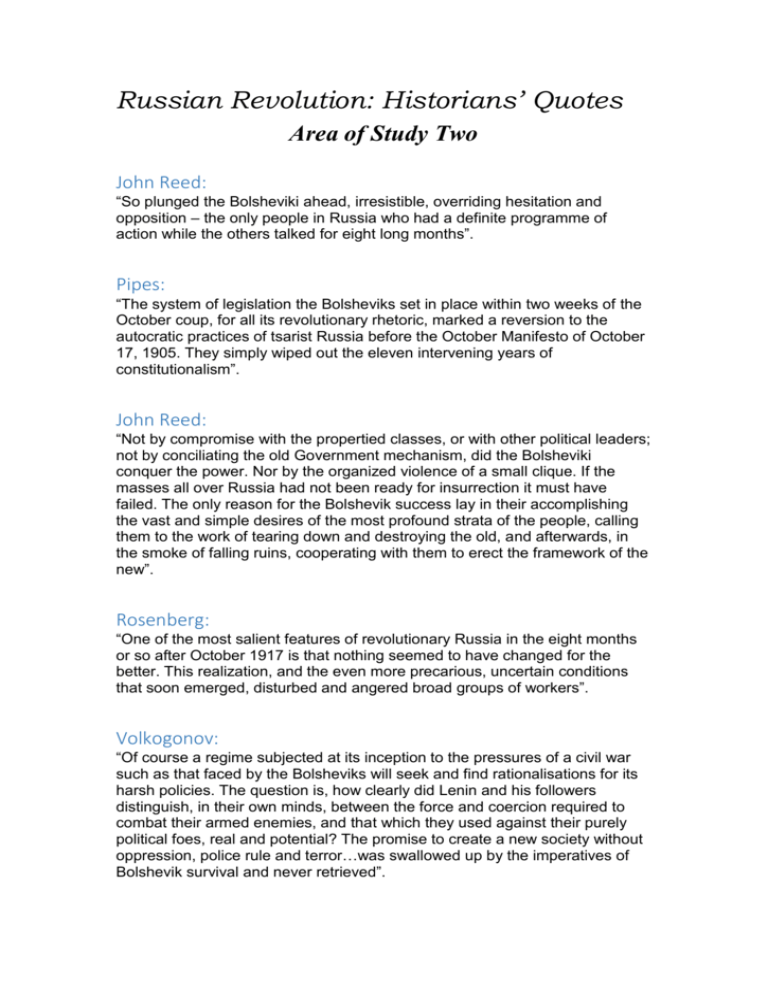
Russian Revolution: Historians’ Quotes Area of Study Two John Reed: “So plunged the Bolsheviki ahead, irresistible, overriding hesitation and opposition – the only people in Russia who had a definite programme of action while the others talked for eight long months”. Pipes: “The system of legislation the Bolsheviks set in place within two weeks of the October coup, for all its revolutionary rhetoric, marked a reversion to the autocratic practices of tsarist Russia before the October Manifesto of October 17, 1905. They simply wiped out the eleven intervening years of constitutionalism”. John Reed: “Not by compromise with the propertied classes, or with other political leaders; not by conciliating the old Government mechanism, did the Bolsheviki conquer the power. Nor by the organized violence of a small clique. If the masses all over Russia had not been ready for insurrection it must have failed. The only reason for the Bolshevik success lay in their accomplishing the vast and simple desires of the most profound strata of the people, calling them to the work of tearing down and destroying the old, and afterwards, in the smoke of falling ruins, cooperating with them to erect the framework of the new”. Rosenberg: “One of the most salient features of revolutionary Russia in the eight months or so after October 1917 is that nothing seemed to have changed for the better. This realization, and the even more precarious, uncertain conditions that soon emerged, disturbed and angered broad groups of workers”. Volkogonov: “Of course a regime subjected at its inception to the pressures of a civil war such as that faced by the Bolsheviks will seek and find rationalisations for its harsh policies. The question is, how clearly did Lenin and his followers distinguish, in their own minds, between the force and coercion required to combat their armed enemies, and that which they used against their purely political foes, real and potential? The promise to create a new society without oppression, police rule and terror…was swallowed up by the imperatives of Bolshevik survival and never retrieved”. Pipes: “The machine gun became for them the principle instrument of political persuasion…and they could use it with impunity” (on the closing of the Constituent Assembly). Rosenberg: “At the risk of emphasizing the obvious, let me stress, first the importance of remembering that whereas the Bolsheviks came to power reflecting politically the perceived interests and will of a great number of Russia’s fifteen to eighteen million workers, they did so only as part of a vast social upheaval over which they had, in fact, very little control…the overthrow of the old order involved, simultaneously, a massive, and ultimately for the Bolsheviks, problematic assault on a wide array of social relationships and values that reflected Russia’s social institutions”. Volkogonov: “…Lenin wanted earthly happiness for the people, at least those he called ‘the proletariat’. But he regarded it as normal to build this ‘happiness’ on blood, coercion and the denial of freedom”. Lynch: “It is doubtful whether, even without that threat (to the Bolsheviks survival) Bolshevism could have developed other than as an oppressive system. Its dogmatic Marxist creed made it as intolerant of other political creeds as tsardom had been”. Hill: “The attempt to overthrow the Bolsheviks after the revolution produced cruelties indeed; but the revolutionary process abolished a regime of despair and created a new world of hope”. Trotsky: “The execution of the Tsar and his family was needed not only to frighten, horrify and instill a sense of hopelessness in the enemy, but also to shake up our own ranks, to show that there was no retreating, that ahead lay total victory or total doom”. Figes: “It (the murder of the Romanov family) was a declaration of the Terror. It was a statement that from now on individuals would count for nothing in the civil war”. Pipes: “…the ‘Red Terror’ was not a reluctant response the actions of others but a prophylactic measure designed to nip in the bud any thoughts of resistance to the dictatorship”. Volkogonov: “Threatened by danger, the Bolsheviks resorted to the most repugnant means of saving their state, mass terror against their own people. They kept Lenin’s promise to turn the imperialist war into a civil war”. Smith: “The belief that the end justified the means served them well, blinding them to the way in which means corrupt ends”. Figes: “The Bolshevik Terror came up from the depths. It started as a social revolution, a means for the lower classes to exact their own bloody revenge on their former masters and class enemies”. “The Red Terror did not come out of the blue. It was implicit in the regime from the start…The Bolsheviks were forced to turn increasingly to terror to silence their political critics and subjugate a society they could not control by other means”. “Under Lenin’s regime – not Stalin’s – the Cheka was to become a vast police state. It had its own leviathan infrastructure, from house committees to the concentration camps, employing more than a quarter of a million people”. J.P. Nettl: “The machinery of counter-terror and repression grew piecemeal but rapidly from each challenge to Bolshevik authority”. Service: “Lenin, Trotsky and Dzerzhinsky believed that over-killing was better than running the risk of being overthrown”. Volkogonov: “The leaders of the revolution had become priests of terror”. “Lenin himself was the patron saint of the Cheka”. “As during the French Revolution the knife of the guillotine ceaselessly reaped its doleful harvest, so now the Cheka gunned its way through the population.” “Like the sound of a bolt being shot, the two syllables, Che-ka, would stop any conversation”. “The guillotine of the Russian Revolution was the gun”. Smith: “…it is the Bolsheviks’ incapacity to realise their ends, their blindness rather than their vision, that is striking. After they came to power, they faced a huge range of problems for which Marxism-Leninism left them ill-equipped…Policy, therefore, was frequently the outcome of improvisation and pragmatism as much as of the hallowed tenets of ideology. In other words, the relationship between belief and action was complex, influenced by a far larger range of factors”. Volkogonov: “Having seized power, he (Lenin) shrugged off the cape of Social Democrat and donned the cloak of the Jacobin. All his attitudes were now conditioned by one consideration: to cling to power at any cost”. Pipes: “Their irresponsibility was nowhere more evident than in their obstinate attempts to introduce a money-less economy” (on induced hyper-inflation during War Communism). Figes: “…War Communism was not just a response to the civil war; it was also a means of making civil war…the policies of War Communism were seen by the Bolsheviks as an instrument of struggle against their social or ‘internal’ enemies”. Volkogonov: “Lenin apparently never asked himself why, before 1921, the Bolsheviks were incapable of giving the people anything but chaos, civil war, hunger and terror. The fact is, the Bolsheviks had achieved their goal: the Party had power”. Nove: “In interpreting the events of 1917-21, it is important to bear in mind the following. Firstly, there was a good deal of anarchy, of sheer elemental chaos, in the situation of Russia in those years. Orders by the centre might be obeyed, but quite probably the local authorities, even if communist-controlled, pleased themselves. Orders were in any case all too often confused and contradictory, though sheer inexperience or because the civil service machine was all too effectively smashed…Therefore much that happened was not due to central orders at all, and many of these orders were due to desperate efforts to cope with confusion and anarchy”. History of the CPSU (b.) short-course: “War Communism had been an attempt to take the fortress of the capitalist elements in town and countryside by assault, by a frontal attack. In this offensive the Party had gone too far ahead, and ran the risk of being cut off from its base. Now Lenin proposed to retire a little, to retreat for a while nearer to the base, to change from an assault of the fortress to the slower method of siege, so as to gather strength and resume the offensive”. Volkogonov: “It seem unlikely that the Bolsheviks gave any thought to the fact that giving promise while in opposition is a different thing from fulfilling it in government. On every point - peace, land, liberty, Constituent Assembly, freedom of the press and all the rest – their promises rapidly changed into coercion, limitation, alteration, a different ‘reading’ or an outright denial. Even the land, which they did give, they made undesirable by confiscating everything it produced”. Figes: “Half a million Red Army soldiers joined the Bolshevik Party during the civil war. These were the missionaries of the revolution. They carried Bolshevism, its ideas and its methods, back to their own towns and villages, where they flooded into the Soviet institutions during the early 1920s. The whole Soviet apparatus was thus militarized…The success of the Red Army increasingly led to the application of military methods throughout the Soviet system. Nothing did more to shape the ruling attitudes of the Bolsheviks than the experience of the civil war…The Bolshevism that emerged from the civil war viewed itself as a crusading brotherhood of comrades in arms, conquering Russia and the world with a red pencil in one hand and a gun in the other”. Service: “In particular, he [Lenin] had little foresight about what he was doing when he set up the centralised one-party state. One of the great malignancies of the 20th century was created more by off-the –cuff measures than by grandiose planning.” Service: “…how new was the world being built by Lenin and Sovnarkom? The RSFSR had facets reminiscent of the tsarist order at its worst. Central power was being asserted in an authoritarian fashion. Ideological intolerance was being asserted and organised dissent repressed. Elective principles were being trampled under foot”. Lynch: “1917 did not mark a complete break with the past. Rather it was the replacement of one form of state-authoritarianism with another”. Figes: “There was no master plan. When the Bolsheviks came to power they had no set idea – other than the general urge to control and centralize – of how to structure the institutional relationships between the party and the Soviets…Only during the civil war, when they stressed the need for strict centralized control to mobilize the resources of the country, did the Bolsheviks plan the general structure of the party-state”. Pipes: “So unnatural were the new conditions, they so outraged common sense and decency, that the vast majority of the population viewed the regime responsible for them as a terrible and inexplicable cataclysm which could not be resisted but had to be endured until it would vanish as suddenly and as inextricably as it had come”. Smith: “The Bolshevik revolution wrought calamity on a scale commensurate with the transformation in the human condition it sought to achieve. Measured by the benchmarks of contemporary politics, Bolshevik ambition leaves us reeling. But it is easier for us today to appreciate the illusions under which they laboured than the ideals they sought to achieve. Yet we shall never understand the Russian Revolution unless we appreciate that the Bolsheviks were fundamentally driven by outrage against the exploitation at the heart of capitalism and the aggressive nationalism that had led Europe into the carnage of the First World War. The hideous inhumanities that resulted from the revolution, culminating in Stalinism, should not obscure that fact that millions welcomed the revolution as the harbinger of social justice and freedom”. Service: “The soviet order was extremely disorderly for a great deal of the time. Yet the movement towards a centralised, ideocratic dictatorship of a single party had been started. Neither Lenin nor his leading comrades had expressly intended this; they had few clearly elaborated policies and were forever fumbling and improvising. Constantly they found international, political, economic, social and cultural difficulties less tractable than they assumed. And constantly they dipped into their rag-bag of authoritarian concepts to help them survive in power…and they felt that the ruthless measures were being applied in the service of a supreme good”. Volkogonov: “The Russian revolutionaries, including Lenin, rightly exposed the age-old evils of human existence, the exploitation, inequality, lack of freedom. But having acquired the opportunity to abolish these evils, the Leninists established a new, barley disguised form of exploitation to be carried out by the state…In the last analysis, the Leninist promise of great progress turned into great backwardness”. Service: “The basic compound of the Soviet order had been invented by Lenin and his fellow communist leaders within a couple of years of the October Revolution. There had been created a centralized, one-ideology dictatorship of a single party which permitted no challenge to its monopoly of power…Civil war had added to the pressures which had resulted in the creation of the compound. On taking power in 1917, the communist leaders had not possessed a preparatory blueprint. Nevertheless they had come with assumptions and inclinations which had predisposed them towards a high degree of state economic dominance, administrative arbitrariness, ideological intolerance and political violence”. Volkogonov: “Dogma deprived the Bolsheviks of common sense”. Pipes: “The Bolsheviks ceased to be utopians when, once and for all it had become obvious the ideal was unattainable, they persisted in the attempt by resorting to unrestrained violence”. Service: “Despite all the problems, the Soviet regime retained a vision of political, economic and cultural betterment. Many former army conscripts and would-be university students responded enthusiastically. Many parents, too, could remember the social oppressiveness of the pre-revolutionary tsarist regime and gave a welcome to the Bolshevik party’s projects for literacy, numeracy, cultural awareness and administrative facility”. Figes: “The Russian Revolution launched a vast experiment in social engineering – perhaps the grandest in the history of mankind…The experiment went horribly wrong, not so much because of the malice of its leaders, most of whom had started out with the highest of ideals, but because their ideals were themselves impossible”. Volkogonov: “…despite the fact that millions of honest people, led by the ‘vanguard of the revolution’, laboured for it, the utopia remained a fairy-tale”. Fitzpatrick: “Communists of the 1920s were afraid of class enemies, intolerant of cultural pluralism and uneasy about the lack of unity in the party leadership and the loss of a sense of direction and purpose. They wanted their revolution to transform the world, but it was very clear during the NEP how much of the old world had survived…Many rank-and-file Communists and sympathizers, especially among the young, were becoming disillusioned, inclined to believe that the revolution had reached an impasse…It was a mood of restlessness, dissatisfaction, and barely subdued belligerence and, especially among the party youth, nostalgia for the old heroic days of the Civil War”. Figes: “…the fact remained that within the village the Bolsheviks were without real authority. This was the root failure of the NEP. Unable to govern the countryside by peaceable means, the Bolsheviks resorted to terrorizing it, ending up in collectivization. The events of 1918-21 had left a deep scar on peasant-state relations. Although the civil war between them had come to an end, the two sides faced each other with deep suspicion and mistrust during the uneasy truce of the 1920s…Militant Bolsheviks were increasingly afraid that the revolution would degenerate, that it would sink in the ‘kulak’ mud, unless a new civil war was launched to subjugate the village to the town. Here were the roots of Stalin’s civil war against the village, the civil war of collectivization. Without the means to govern the village, let alone transform it on socialist lines, the Bolsheviks sought to abolish it instead”. Service: “Most Bolshevik leaders had never liked the NEP, regarding it as an excrescent boil on the body politic and at worst a malignant cancer”. Figes: “Having defeated the Whites, who were backed up by no fewer than eight western powers, the Bolsheviks surrendered to the peasantry” (on the NEP). Fitzpatrick: “…the Right was promising much less in the way of achievement than Stalin; and the party in the late 1920s was hungry for achievement, and it did not have our retrospective knowledge of what it was going to cost. The Right, after all, was promising a moderate, small-gains, low conflict programme to a party that was belligerently revolutionary, felt itself threatened by an array of foreign and domestic enemies, and continued to believe that society could and should be transformed”. Service: “Bolshevik leaders, unlike tsars, strove to identify themselves with ordinary people…central party leaders tried to present themselves as ordinary blokes with un-flamboyant tastes…interest in fine clothes, furniture or interior décor was treated as downright reactionary. A roughness of comportment, speech and dress was fostered”. Lynch: “Trotsky never had control of the political system as it operated in Soviet Russia. Politics is the art of the possible. After 1924 all the possibilities belonged to Stalin.” John Reed: “He’s not an intellectual like the other people you will meet…but he know what he wants. He’s got willpower, and he’s going to be top of the pile some day” (on Stalin, 1919). Lynch: “The grey blur was about to become the Red tsar” (on Stalin’s defeat of the Left and then the Right during the 1920s). Ward: “Trotsky and Bukharin might win the argument, but Stalin invariably won the vote”. E.H. Carr: “A triumph not of reason, but of organisation” (on Stalin’s rise to power). Deutscher: “It seemed to Trotsky almost a bad joke that Stalin, the willful and sly but shabby and inarticulate man in the background should be his rival”. Figes: “On the one hand it seems clear that the basic elements of the Stalinist regime – the one-party state, the system of terror and the cult of personality – were all in place by 1924. The party apparatus was, for the most part, an obedient tool in Stalin’s hands. The majority of its provincial bosses had been appointed by Stalin himself, as the head of the Orgburo, in the civil war. They shared his plebian hatred for the specialist and the intelligentsia, were moved by his rhetoric of proletarian solidarity and Russian nationalism, and on most questions of ideology were willing to defer to their Great Leader. After all, they were the former subjects of the tsars…On the other hand, there were fundamental differences between Lenin’s regime and that of Stalin. Fewer people were murdered for a start. And, despite the ban on factions, the party still made room for comradely debate”. Pipes: “once...the totalitarian machine was in place, then the rise of Stalin became virtually a foregone conclusion” Three Whys of the Revolution Pipes: “unilinear explanation of historical phenomena like the Marxist one s bound to be false, and can be sustained only by ignoring events that do not fit the class interpretation” Three Whys of the Revolution Pipes: “Continuity was facilitated by the fact that a high percentage of Soviet administrative posts were stagged by ex-tsarist functionaries, who brought with them and communicated to Communist newcomers habits acquired in the tsarist services” Three Whys of the Revolution Fitzpatrick: “forthright about their own use of terror...and they took pride in being toughminded about violence” The Russian Revolution Fitzpatrick: “did not see any parallel to the Tsarist secret police, though Western historians have often drawn one. The Cheka, in fact, operated much more openly and violently than the old police” The Russian Revolution

